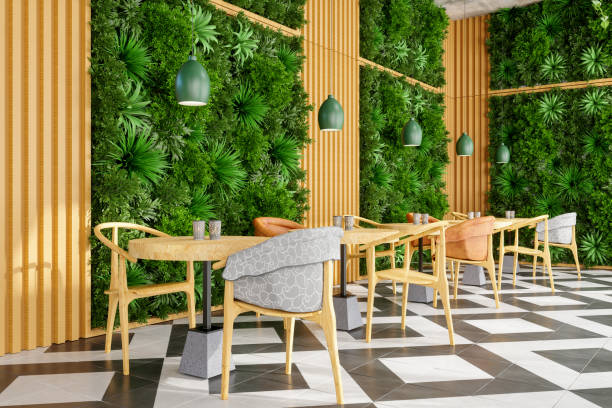The hospitality sector has been significantly shaped by sustainability in recent years, and restaurant owners are looking for more methods to incorporate environmentally friendly practices into their daily operations. Energy-efficient equipment and trash reduction are only two examples of how organisations may embrace sustainability. However, furniture—more especially, the bar stools that are a common feature in many restaurant and bar settings—is one area that is frequently disregarded. Demand for eco-friendly restaurant bar stools has increased due to a move towards sustainable practices and increased awareness of environmental problems. In addition to encouraging sustainability, these furnishings give the restaurant’s overall design a sleek, contemporary feel.
WHAT MAKES RESTAURANT BAR STOOL ECO-FRIENDLY
Every step of an eco-friendly restaurant barstools life cycle—from sourcing materials to manufacture to ultimate disposal or recycling—is built with sustainability in mind. The following are the main elements that make a bar stool environmentally friendly:
Sustainable Materials: One of the most crucial features of an eco-friendly bar stool is using recycled or renewable materials. Materials like bamboo, repurposed wood, recycled metals, and natural fibres (like hemp or jute) are excellent options for furniture that have little impact on the environment. These materials come from sources that guarantee little environmental harm, including ethical forestry methods or recycling procedures that keep trash out of landfills.
Durability and lifetime: The sustainability of a stool is greatly influenced by its lifetime. Durable, well-made furniture will endure longer and require replacement less frequently. In addition to reducing waste, this guarantees that the materials used to make the stools are not wasted. Sturdy materials and excellent craftsmanship reduce the likelihood of a stool breaking down or wearing out too soon.
Low-VOC Finishes: Volatile organic compounds (VOCs), frequently found in conventional paints and varnishes, can emit hazardous chemicals into the atmosphere and exacerbate indoor air pollution. Low-VOC or VOC-free paints, stains or lacquers are commonly used to finish eco-friendly bar stools, which makes them safer for the environment and the patrons or employees of the restaurant.
Ethical Manufacturing: Materials are only one aspect of sustainability. Another crucial factor to take into account is the ethical manufacturing process. Manufacturers of eco-friendly bar stools frequently concentrate on lowering their carbon footprint by using water-saving techniques, cutting waste, and employing energy-efficient procedures. In addition, many companies are dedicated to ensuring that their manufacturing sites follow ethical labour standards and that workers receive fair compensation.
Recyclability and End-of-Life: Ideally, environmentally friendly bar stools are made to be simple to disassemble and recycle. This prevents the stool from ending in a landfill at the end of its useful life and enables it to be recycled or used again. Recyclability-focused manufacturers ensure that the stool’s upholstery, metal, and wood can be separated, recycled, or used again when it’s no longer needed.
WHY RESTAURANT OWNER CHOOSE ECO-FRIENDLY BAR STOOL
There are several strong arguments for restaurant owners to select eco-friendly bar chairs for their spaces in addition to promoting environmental sustainability:
Fulfilling Customer Demand for Sustainability: As sustainability gains traction in international discussions, consumers are becoming more conscious of how their decisions, including where they eat, affect the environment. Nowadays, many customers look for companies that show a dedication to the environment. Restaurants may draw in eco-aware patrons and establish a reputation for being environmentally sensitive by utilising eco-friendly furnishings.
Savings: Despite sometimes costing more upfront than conventional furniture, eco-friendly bar stools are frequently more resilient and require less upkeep over time. Restaurant operators may save money due to having to repair the stools less regularly. Furthermore, operating costs may decrease by using sustainable measures like recycling, waste reduction, and energy conservation during production.
Improved Brand Image: Including sustainability in a restaurant’s layout and operations improves the company’s reputation. When a restaurant tries to reduce its environmental effects, patrons are more likely to have a favourable opinion. Eco-friendly furnishings provide a restaurant’s dedication to sustainability a concrete, noticeable component that reaffirms to patrons that the establishment is progressive and accountable.



